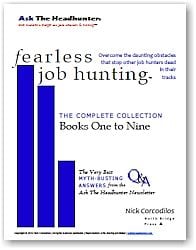In the April 19, 2016 Ask The Headhunter Newsletter, a reader asks how to get in the door for a seemingly impossible job change.
Question
I want to make a big career change into medical device sales, but it’s going to be tricky. My experience is in teaching, primarily English as a second language. I don’t expect to get a sales job to start, so I want to start out in sales support. I’ve done tons of research on the company I’ve chosen, its technology and products, and I’ve even talked to some of the company’s customers — doctors and medical centers. I know that their salespeople’s time is worth a little over $1,000 an hour, so good sales support is key to profitability.
Two contacts — an old friend and her friend — work in the company where I want a job, and I’m using LinkedIn to find more contacts. I have read both your How Can I Make a Career Change? (I thoroughly enjoyed my library vacation) and Fearless Job Hunting books, and I am following your advice. But my execution might be a bit rocky. How can I parlay these contacts into more connections that might help me get in front of the right manager to talk about a seemingly impossible job change?
Nick’s Reply
You’re right — that’s a huge, daunting leap. Medical sales is a tough field to get into. Your odds aren’t good, but I don’t believe in odds or in luck. I believe in hard work. If you really want to do this, do all the hard work and don’t let anything deter you until you either get the job or exhaust every avenue.
But you didn’t ask my permission. You asked how to get in the door.
It’s going to require more than one or two contacts, so you need to leverage your two friends to meet more people in the company. I’m both a fan and an antagonist when it comes to LinkedIn. It’s the best online phonebook ever developed. On the other hand, it’s become just another job board after squandering its future as a true networking tool.
Leverage LinkedIn
Here’s how to use LinkedIn to help you with this. Ask your friends for one or two names of people who work in or near the department at the company where you want to work. Then search both LinkedIn and Google to find them, and then more people who are connected to the company’s product areas where you want to work. (I suggest you re-read “A Good Network Is a Circle of Friends,” pp. 27-32 in How Can I Change Careers?)
Search Google for the company name plus the product names and related technologies. Let me caution you here: Google Search and Google News are different. You’ll turn up different results. I prefer News because the results will surface names of specific people and stories about them — and that’s what you want. The more relevant names you can dig up this way, the better. Then look up each person on LinkedIn — and ask your friends if they know them.
When you contact someone you found this way, you don’t have to rely on that tenuous LinkedIn “connection” to get their attention. (I hate it when someone reaches out to me and says, “I found you on LinkedIn!” So what? They might as well have found me in the phone book!) You should refer to the news article you read about them. Talk shop, and mention the two people you know at the company:
How to Say It:
“I was just talking to Mary Smith, who works in the Blah-Blah department at your company, and I also just read this article in the Wall Street Journal about your role in your company’s…”
Talk shop!
You’ve clearly done your homework — Good for you! — so you can actually ask them a couple of intelligent questions about their work. This tells them you’re not some LinkedIn opportunist who ran a keyword search to “find” them. You actually know something about what they do. This puts you on a very different footing from someone who’s calling around for job leads via LinkedIn.
Having started a work-related — if very simple — discussion, you can move on to your objective:
How to Say It:
“I wonder if I could ask you for some advice. My background is… and I’m considering a job in sales support. I don’t just want to send in a resume, because I’d like to learn more about the support function in sales of XYZ devices. I know that a sales person’s time at your company is worth about $1,000 an hour, so sales support is an important lever for profitability. Is there someone you can recommend that I talk with in sales or sales support so I can learn more about the role?”
Isn’t that more powerful than saying, “Hey, do you know of any job leads at your company?” You will leave your competitors in the dust. Here’s another way to break the ice with such a contact:
How to Say It:
“I noticed in the article I read that you work with the Hannenframmis device line. Another company, X, makes a related device they call a Thingamajig. What do you think of their product?”
A question like that tells the person you’ve studied the company, its products and its competition. What LinkedIn query goes into such detail? Your request is out of the ordinary. You’re not asking for a job lead — you’re talking shop. When you ask someone for their opinion or advice about something relating to their work, I find they usually want to share their thoughts.
Once again, having established a bit of credibility, it’s easy to switch to:
“Hey, I wonder if I could ask you for some advice…” and use the How to Say It suggestion above.
Critical Mass: Nobody said it was easy
If they don’t recommend anyone, just say, “Thanks — it was good to meet you. Thanks for your time,” and move on. But my guess is they will offer you some help. One new contact and referral thus leads to another. You learn something new every step of the way, and you will build a critical mass of contacts and insight. Some of them will know one another — and that builds your credibility further as you navigate the company to find the right manager in sales.
One of your new friends will refer you to a manager who will recognize a highly motivated person who wants to work in sales support. Without applying for a job, you’ll be an insider. When you get near that manager, re-read Fearless Job Hunting, Book 3: Get in The Door (way ahead of your competition), “Share Experiences: The path to success,” pp. 12-14, and “Pest, or manager’s dream?” pp. 18-19.
I’ll caution you: This is not easy or quick, nor should it be. While your competition is sending keywords to HR managers, you’ll be talking to insiders — that requires dedication and focus. Managers tend to hire people they know, or people referred by trusted contacts. That’s what this approach gradually turns you into — an insider — if you invest the time to do the homework, to talk with people patiently, and to learn all you can about the company you want to work for so you can demonstrate why you’re the profitable hire.
How do you get in the door when the job you want is a big change from what you’ve been doing? Ever make a big career change? What would you suggest to this earnest reader?
: :


 Nick’s Reply
Nick’s Reply Today (March 1) we’re joined by some special guests! A big welcome to IT professionals from
Today (March 1) we’re joined by some special guests! A big welcome to IT professionals from 

 Contrary to the title of this Q&A, you’re not really afraid your millennial daughter is making a career mistake. You’re just afraid that you’re afraid she is. So I give you credit for starting a candid discussion about this, and for giving your daughter a chance.
Contrary to the title of this Q&A, you’re not really afraid your millennial daughter is making a career mistake. You’re just afraid that you’re afraid she is. So I give you credit for starting a candid discussion about this, and for giving your daughter a chance. My skill set wasn’t developed by being average, and I will not accept anything average. I make my employer lots of money. I impact the bottom line and that will cost you.
My skill set wasn’t developed by being average, and I will not accept anything average. I make my employer lots of money. I impact the bottom line and that will cost you.





